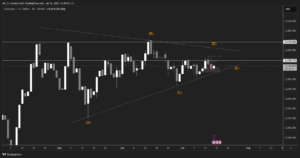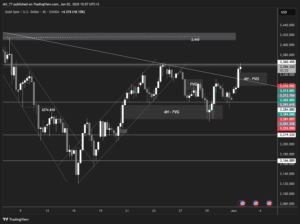European stocks rose after Credit Suisse announced it would borrow 50 billion Swiss francs from SNB.
European stocks rose at the open on Thursday as investors breathed a sigh of relief after the Swiss Central Bank said it would provide liquidity to support Credit Suisse.
Credit Suisse announced that it would borrow up to 50 billion Swiss francs (about $54 billion) from the central bank under a facility that includes a covered loan and short-term liquidity, which should allay some concerns about risks to the financial system.
The Stoxx Europe 600 Index rose 1.18% to 441 points, at 08:06 GMT, with gains led by banking stocks increasing by more than 3.00%.
The British FTSE 100 index rose 1.40% to 7448 points, the German DAX index rose 1.62% to 14974 points, and the French CAC index rose 1.72% to 7004 points.
Investors will focus on the ECB’s monetary policy decision later today, with expectations of the central bank announcing a 50 basis point rate hike.
Japanese stocks fell as bond yields fell.
The Nikkei index fell at the close of Thursday’s session, with the decline in the yield of Japanese treasury bonds, in light of the continuing concerns of the crisis in the banking sector.
The 10-year Japanese bond yield fell five basis points to 0.27%, well below the BoJ’s maximum limit.
Government data showed Japan’s trade deficit widened to 897.7 billion yen ($6.6 million) in February, up 26.2 percent year-on-year, with exports and imports growing less than expected.
The Nikkei index fell at the end of the session by 0.80% at 27010 points, and the broader Topix index fell slightly by 1.17% to 1937 points. The US dollar fell against its Japanese counterpart, by 0.45%, at 132.83 yen, at exactly 06:59 GMT.
Demand for safe haven currencies due to fears of a global banking crisis.
Safe-haven currencies such as the dollar and the yen were sold Thursday amid fears of a global banking crisis after the impact of the collapse of Silicon Valley in the United States spilled across the Atlantic to Credit Suisse in Switzerland.
In the latest blow to investor confidence in the financial sector, Credit Suisse shares plunged on Wednesday by as much as 30% after the bank’s largest shareholder said it could not offer it more support.
In an unprecedented move, the decline in shares of the troubled lender prompted the Swiss National Bank to provide it with a bailout. Credit Suisse announced in early Asian trading Thursday that it would borrow up to 50 billion Swiss francs ($54 billion) from the central bank.
Traders flocked to traditional safe-haven currencies, boosting the dollar and the yen, amid growing fears that the stress unfolding between banks in the United States and Europe could be a harbinger of a broader crisis.
The yen jumped about 0.5% in early Asian trading and recorded 132.73 in the latest trading against the dollar after gaining 0.6% yesterday, Wednesday.
Against the Swiss franc, the greenback lost some of the advances it recorded in the previous session and reached 2.15%, the biggest daily gain since 2015, but kept the franc close to its lowest level in a week.
“We have some new turmoil in the European banking sector, and things are still very volatile at the moment,” said a currency analyst at the Commonwealth Bank of Australia, “Carol Kong.” “Given the extreme uncertainty and concerns about a broader financial contagion, the dollar, and yen will be the main beneficiaries due to the demand for safe havens,” she added.
The euro compensated for some of its losses in early Asian trading, as it rose in the latest transactions by 0.04% to 1.0582 dollars after falling 1.4% in the previous session. The pound sterling rose 0.18% to $1.20775 after falling about 0.9% yesterday, Wednesday.
The dollar index, which measures the performance of the US currency against a group of currencies, fell 0.07% to 104.58 after jumping about 1% in the previous session.
Credit Suisse, struggling to recover from a series of scandals that have undermined investor and customer confidence, is the latest victim of the confidence crisis after the collapse of Silicon Valley last week.
The shutdown of Silicon Valley on Friday, followed by the collapse of Signature Bank two days later, prompted US President Joe Biden to reassure that the financial system was safe and started emergency measures in the US to make more funding available to banks.
Gold prices fell by more than $10.
Gold prices fell Thursday as traders sought clarity on the financial sector, especially as Credit Suisse renewed concerns about a banking crisis.
And futures contracts for the yellow metal for April delivery decreased by 0.64%, or $ 12.4 an ounce, at $ 1918.9 an ounce, at exactly 07:19 GMT, and the spot price for delivery decreased by 0.19%, to $ 1914.84 an ounce.
Silver futures for May delivery fell 0.37% to $21.80 an ounce, and the spot price of platinum rose 0.30% at $967.62, while palladium fell 0.83% to $1454.34.
This comes with concerns about Credit Suisse, whose shares fell by more than 20%, despite the bank’s announcement that it will borrow 50 billion francs ($53.7 billion). JP Morgan analysts expect gold prices to reach $2,000 an ounce this year.
Oil makes up for some of its losses after falling to its lowest level in over a year.
Oil prices rose in early Asian trading Thursday, March 16th, recouping some of the losses after hitting their lowest levels in more than a year in the previous session, as markets calmed somewhat after Swiss regulators decided to bail out Credit Suisse.
Brent crude futures rose 85 cents, or 1.2%, to $74.54 a barrel. US oil futures rose 74 cents, or 1.1%, to $68.35 a barrel.
The two benchmarks rose by more than a dollar earlier in Thursday’s session, and yesterday, Wednesday, they fell to their lowest levels since December 2021 after falling for three consecutive days.
Brent has lost nearly 10% since Friday’s close, while US crude has fallen about 11%.
Later on Thursday, European Central Bank policymakers are expected to be tempted to raise interest rates by half a percentage point as the euro-zone economy regains strength. In contrast, inflation is expected to remain high for years.
Higher interest rates could lower demand for oil as economic growth slows. Fears of exacerbating the financial crisis in the banking sector could also affect oil demand. Meanwhile, data showed a recovery in Chinese economic activity in the first two months of 2023 after the cancellation of strict coronavirus containment measures.
The monthly report issued by the International Energy Agency on Wednesday indicated an expected increase in oil demand from China, a day after OPEC raised its forecast for Chinese demand in 2023.
US indices cut their losses at the close after the Swiss Central Bank’s statements, and bond yields fell strongly.
The Dow Jones and S&P500 trimmed losses, and the Nasdaq Composite rose at the close after the Swiss central bank said it was ready to provide liquidity to Credit Suisse if needed.
Producer price data in the US also raised hopes that the pace of interest rate hikes by the Federal Reserve will be reduced.
US indices recorded sharp losses early in the session on Wednesday after the Swiss bank crisis revived again from fears of a global banking crisis. Credit Suisse shares listed in the United States recorded a record drop after its largest investor said it could not provide more financing. The bank, which led to a crisis in European lenders and put pressure on American banks as well, exacerbated the problems of the US banking sector once again after the US authorities calmed investors with emergency measures to prevent infection after the collapse of SVB and Signature banks.
A separate report showed that US producer prices fell unexpectedly in February, a day after another reading showed moderate inflation. This raised investors’ hopes that the Federal Reserve may slow down interest rate hikes.
The 2-year US Treasury yield fell to its lowest level in 6 months, as investors now expect equal chances of a 25 basis point rate hike and rate stabilization at the Fed’s March meeting.
In Wednesday’s session, the Dow Jones index fell by 0.9%, or the equivalent of 280 points, after cutting its losses, which amounted to more than 700 points, in early trading. However, the closing levels remained near their lowest in 5 months amid a collective decline in the main sectors, led by the industrial and banking sectors, which declined by about 6% and 5%, respectively.
The S&P 500 index declined by 0.7% to close at 3,891 points, under pressure from the sharp drop in First Republic and PacWest Bancorp shares, a day after the strongly affected bank shares recovered.
On the other hand, the Nasdaq Composite Index succeeded in covering all its early losses and closing up by 0.05% to remain above the 200-day moving average.
Disclaimer: This article is not investment advice or an investment recommendation and should not be considered as such. The information above is not an invitation to trade and it does not guarantee or predict future performance. The investor is solely responsible for the risk of their decisions. The analysis and commentary presented do not include any consideration of your personal investment objectives, financial circumstances, or needs.





